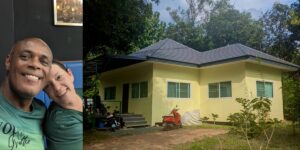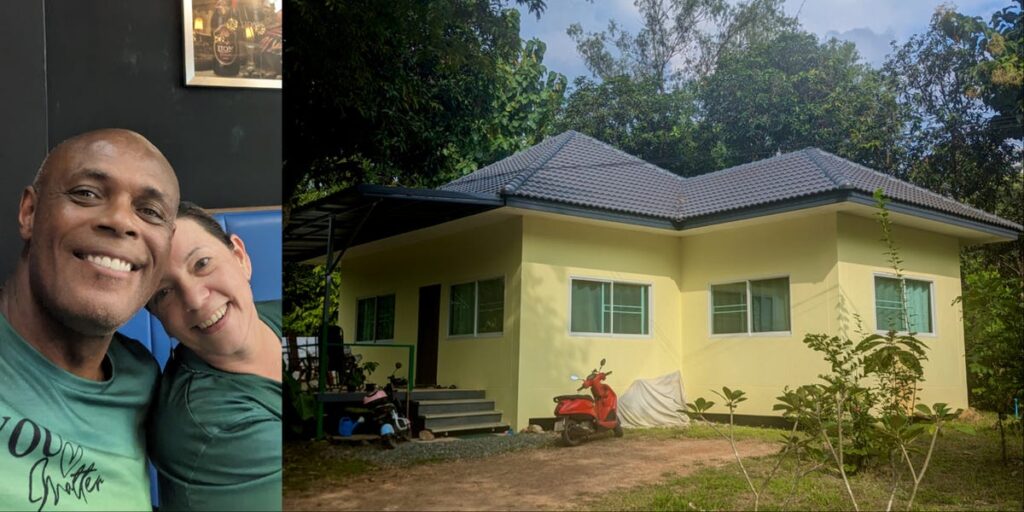- A month after retiring from his 26-year career in law enforcement, Fred Jones moved from Florida to Thailand.
- He now lives in a $540-a-month two-bedroom house in Chiang Mai with his wife and their dog.
- He says life is cheaper, safer, and less stressful than it was back in the US.
A visit to the doctor in 2007 planted the idea of living overseas in Fred Jones‘ head.
He had picked up a copy of International Living magazine while sitting in the waiting room, and it introduced him to the world of people who retired abroad.
“I had no idea that people were doing that. I just thought people vacationed, then came back to their 9-to-5s and kept on with their lives,” Jones, 56, told Business Insider. “It really opened my eyes to the possibility of living overseas, especially at that time when I was focused on the cost of living.”
The original plan was to move to Ecuador after he retired, but with the escalating violence in the country, Jones and his wife decided to look elsewhere. That’s when he remembered his first trip to Vietnam back in 2018.
“It was only nine days, but I fell in love with Southeast Asia,” he said.
On August 19, 2023, Jones retired from law enforcement after 26 years of service.
About a month later, he and his wife packed up their lives, sold their house, and left Lake County, Florida, to embark on their next adventure.
They were moving to Chiang Mai, a province in northern Thailand, sight unseen.
Moving halfway around the globe
Chiang Mai is about 450 miles north of Bangkok. It has long been a popular destination for tourists and expats alike, thanks to its stunning ancient temples, bustling markets, and relatively low cost of living.
Jones says he decided to move there after doing his research and speaking to people he met on expat Facebook groups who had been living in Chiang Mai for years.
“If you look hard enough, there’s a road map out there for you to follow and adjust accordingly to what you need,” he said, adding that being a cop has prepared him “for the unknown.”
One of the main reasons he chose Chiang Mai was because he enjoyed northern Thai cuisine and wanted to live in a place that was quiet but still easily accessible.
“I wanted to go somewhere where I didn’t have all the noise of a city, but I had the conveniences right up the road, too,” he said.
Jones decided to rent instead of buying a house. To him, it didn’t make sense to purchase property in a new country without familiarizing himself with the different areas where he could live.
“To be honest with you, we’ll probably rent for the rest of our lives unless we find a special place that we want to call our home forever,” he said.
Since Jones and his wife flew their dog to Thailand, they were looking for a modern house with a yard. They put an ad on Facebook and ended up finding a place to live easily.
The two-bedroom house is slightly under 1,200 square feet and is located in Doi Saket, about 20 minutes east of Chiang Mai city, the capital of Chiang Mai province. It had everything they needed, including air conditioning and even an oven.
Their house in Chiang Mai isn’t that different from their house back in Florida. Both had two bedrooms, except the couple had a bigger kitchen and a garage back in the US.
“It was comfortable. It felt like it was well-built, and he said it would take care of any kind of maintenance that was required. He even takes care of the lawn, so that’s a bonus,” Jones said, referring to their landlord.
Rent is 18,000 Thai baht, or about $540, each month.
The house sits on an acre of land, and while the couple has neighbors about 25 yards to their left, they “never hear anything,” Jones said.
He said the local market is a five-minute walk away, with bigger grocery stores nearby that stock Western brands as well. Coffee shops are aplenty in their neighborhood, and there’s even an Italian restaurant for when their pasta craving hits.
Finding their community
Despite Jones and his wife not knowing anyone in Chiang Mai before their move, they found a community quite easily.
A large part of it is thanks to their new neighbors — also expats — who showed them around.
Their neighbors also brought them to “Sunday Coffee,” a weekly, informal gathering of expats at a local café.
“There are probably between 12 and 15 expats that meet there every Sunday, from France, New Zealand, America, just so many different countries, and they’re all English speakers,” Jones said. “I sat there, and I absorbed information from people who have been here for 20, 30 years.”
Jones said some of these people have gone on to become his good friends. They meet up regularly for lunch and go on hikes.
“I never saw this coming. I thought it would be like me and my wife just doing things together for a very long time,” he said.
While the language barrier was a concern, Jones says that he and his wife have managed to get by with help from Google Translate.
“My wife is learning the language as we speak, and so that’s going to really help. But the locals have been very accommodating with us not knowing the language,” he said.
Life is simpler and cheaper
Jones and his wife aren’t alone in their decision to leave. The cost of living is rising, and more and more Americans are being priced out of the US.
Even Florida — where the couple is from — isn’t all rainbows and sunshine: While it might be one of the nine states without an income tax, things like home insurance and even healthcare can make it costly to live there.
In recent years, Chiang Mai has become a popular choice for people around the world looking to relocate.
According to November 2023 data from the Bureau of Registration Administration of Thailand, there are 161,979 foreigners living in Chiang Mai province.
Several people that BI previously spoke to shared that the area’s laid-back lifestyle and low costs were factors in their decision to move there. Johnny Ward, a travel blogger, previously told BI that he managed to build his dream “James Bond” villa in Chiang Mai for about $600,000. Australian retiree John Walker rents a studio apartment for less than $200 a month in rent. He told BI that he’s able to save about 40% of his income while living there.
Likewise, life has become a lot simpler for Jones and his wife now that they’re in Chiang Mai.
Jones says that his monthly budget is $2,100, although his expenditure typically comes up to around $1,800. This includes health insurance for him and his wife, as well as miscellaneous travel expenses like a vacation to a nearby town.
“I would say that my wife and I are probably living on a third of what we would be spending in the United States right now,” Jones said.
Feeling safer has lowered stress levels
Cost of living aside, Jones says his mental health has greatly improved since he started living in Chiang Mai.
“I never realized how hypervigilant I was all the time, even off-duty, until I moved here. It’s just like all the stress, having your head on the swivel, all of that stuff just disappeared,” he said.
Being in law enforcement back in Florida meant that he had seen a lot of trauma while on the job. Some of these incidents stayed with him long after he clocked out of his shifts.
“On the weekends, if my wife and I were going to a movie or somewhere, we would pass by places that I could look at and say, ‘That homicide happened over there’ or ‘That rape happened over there,'” he said. “You relive those things in your head over and over again when you live in the same place where you’ve seen all this stuff.”
Living in Chiang Mai has given him “a new beginning where none of that occupies my mind anymore,” he said.
Thanks to low crime rates and strict gun control laws, Jones also feels safer in Chiang Mai than in the US. In fact, ever since he arrived in Asia, he’s been able to sit with his back to the door — something he never used to do.
“That’s what I mean by it being life-changing,” he said.
Living life on his own terms
Perhaps the best part about being retired in Chiang Mai is that he has the freedom to do whatever he wants with his time.
Now that he’s no longer bogged down by work, he gets to indulge in his hobbies and spend time with his loved ones. He said he recently picked up pickleball and at least two days a week, he and his wife will hop on a motorbike to explore the surrounding countryside.
Not only does he have the time to read, but he also finished writing a book, which he self-published earlier this year.
“Statistically, a lot of heart attacks happen on Sunday night or Monday morning because that’s when you’re getting ready to transition into whatever the case may be. But I look forward to Mondays now. I look forward to planning my week out,” Jones said.
“It feels like things have slowed down for me, and it really feels good.”
Have you recently relocated to a new country and found your dream home? If you’ve got a story to share, get in touch with me at agoh@businessinsider.com.
Read the full article here



